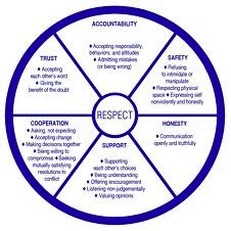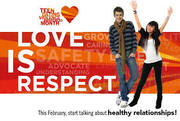HEALTHY RELATIONSHIPS

COMMUNICATION HELPS KEEP KIDS HEALTHY
Research shows that kids have questions about their bodies, puberty, relationships and sexual decision-making, and that they want to get answers to these questions not from the kid next door, but from their parents. Talk to your kids -- openly and honestly.
Planned Parenthood's excellent "Let's Be Honest" program (which includes BHS's annual "Sex and the Sophomore" PTO presentation offers valuable information on how to have direct, productive conversations about all facets of healthy relationships.
CHECK OUT B-PEN'S HEALTHY RELATIONSHIPS FOR TEENS AS WELL AS THE SPECIAL MIDDLE SCHOOL EDITION.
Research shows that kids have questions about their bodies, puberty, relationships and sexual decision-making, and that they want to get answers to these questions not from the kid next door, but from their parents. Talk to your kids -- openly and honestly.
Planned Parenthood's excellent "Let's Be Honest" program (which includes BHS's annual "Sex and the Sophomore" PTO presentation offers valuable information on how to have direct, productive conversations about all facets of healthy relationships.
CHECK OUT B-PEN'S HEALTHY RELATIONSHIPS FOR TEENS AS WELL AS THE SPECIAL MIDDLE SCHOOL EDITION.
|
TEENS ARE WATCHING MORE PORN THAN WE MAY THINK
According to an excellent article in the NY Times Magazine, kids are watching more porn than we think, and it is impacting the way they view intimacy. As parents, it's up to us to counteract those unhealthy messages. Here are some websites to check out: www.CultureReframed.org www.thepornconversation.org www.amaze.org www.scarleteen.com NEW SURVEY ON SEXUAL ASSAULTParents of college and soon-to-be college age youth may be reeling at the new survey showing 1 in 4 women experience sexual assault on campus. But even parents of younger teens should be addressing this issue as early as middle school, reinforcing the concept of CERTS (consent, equality, respect, trust, safety) with kids of all persuasions and genders, acknowledging that alcohol continues to be a major factor in many cases. Parents of college and soon-to-be college age youth may be reeling at the new survey showing 1 in 4 women experience sexual assault on campus. But even parents of younger teens should be addressing this issue as early as middle school, reinforcing the concept of CERTS (consent, equality, respect, trust, safety) with kids of all persuasions and genders, acknowledging that alcohol continues to be a major factor in many cases. Key Findings of the Survey **Overall, 11.7 percent of all student respondents across 27 universities reported experiencing nonconsensual sexual contact by physical force, threats of physical force, or incapacitation since they enrolled at their university. **The incidence of sexual assault and sexual misconduct due to physical force, threats of physical force, or incapacitation among female undergraduate student respondents was 23.1 percent, including 10.8 percent who experienced penetration. **Overall rates of reporting to campus officials and law enforcement or others were low, ranging from five percent to 28 percent, depending on the specific type of behavior. **The most common reason for not reporting incidents of sexual assault and sexual misconduct was that it was not considered serious enough. Other reasons included because they were “embarrassed, ashamed or that it would be too emotionally difficult,” and because they “did not think anything would be done about it.” **More than six in 10 student respondents (63.3 percent) believe that a report of sexual assault or sexual misconduct would be taken seriously by campus officials. Articles on the survey abound, including CNN’s report. WBUR’s “Radio Boston” also did a thought-provoking 20-minute segment. Read the full survey here. EVERYTHING YOU’VE ALWAYS WANTED TO KNOW ABOUT TEEN SEXUALITY…BUT WERE AFRAID TO ASK
As part of National Health Week, B-PEN sponsored a parent forum entitled EVERYTHING YOU’VE ALWAYS WANTED TO KNOW ABOUT TEEN SEXUALITY…BUT WERE AFRAID TO ASK, led by Planned Parenthood Director of Parent Education Amy Cody. The evening event addressed how the hyper-sexuality of today’s culture and unrestricted media access are impacting the impressionable, still-developing teen brain, highlighting what parents need to know to encourage healthy relationships and offering tips for connecting with adolescents on this tricky subject matter. Click here to read the full report... Amy Cody's list of recommended books... B-PEN and the Brookline Wellness Committee also had a breakfast summit to explore issues and strategies around "Teens and Sexuality." Read the report here... |

USE "CERTS" FOR HEALTHY RELATIONSHIPS Whether you're sending an adolescent off to college or back into the social quagmire of middle and high school life, it's good to reinforce some basic information about healthy relationships. When considering romantic entanglements, the CERTS model is a terrific reference to keep in mind: Consent (needs to be mutual, sober, awake, enthusiastic, verbal – if mixed messages, slow down) Equality Respect Trust Safety **** LGBTQ Did you know that 11% of Brookline High School (BHS) students reported that they were either lesbian, gay, bisexual or questioning, according to Brookline’s most recent Youth Risk Behavior Study, Visit B-PEN's special page of understanding and supporting teens who are lesbian, gay, bisexual, transgendered or questioning. Brookline Public Schools' "Comprehensive Social Emotional Learning and Bullying Prevention and Intervention Program" According to the recent master plan, Brookline Public Schools are taking a hard line on bullying, defined as the repeated use by one or more students or a written, verbal, or electronic expression, or a physical act or gesture or any combination thereof, directed at a target that: causes physical or emotional harm to the target or damage to the target’s property; places the target in reasonable fear of harm to him/herself, or of damage to his/her property; creates a hostile environment at school for the target; infringes on the rights of the target at school; or materially and substantially disrupts the education process or the orderly operation of a school. Click here to read the full letter sent to parents. And for more bullying information resources, click here. 
INCREASE IN TEEN DATING VIOLENCE
Did you know that among Brookline teens, 18 cases of dating violence and sexual assault were reported during the past year? Sexual abuse among students is increasing, and even if your teen is not dating or is involved in a healthy relationship, the odds are good that he/she knows someone who is struggling. February 3, Break the Cycle sponsored "It’s Time to Talk Day,” bringing together parents, survivors, celebrities, organizations, and communities to raise awareness of the issues of domestic and dating violence. This year, parents and teens are especially encouraged to start talking about what it means to have a healthy relationship. Starting an ongoing conversation can be one of the most effective ways you can help prevent dating violence. **B-PEN’S TEEN DATING VIOLENCE PAGE **TIPS FOR STARTING THE CONVERSATION **TYPES OF ABUSE **WARNING SIGNS OF ABUSE **HOW TO HELP YOUR CHILD **RESOURCES |
According to statistics from Planned Parenthood, one in three teens has experienced dating violence or relationship abuse. It crosses all racial, economic and social lines This pattern of over-controlling behavior from one partner over another isn’t necessarily physical abuse – it can also be sexual, emotional, verbal and psychological abuse as well. It can occur in serious, long-term relationships as well as casual dating situations, and it can effect same sex relationships as well heterosexual relationships. What can parents do? Check out the special Parent Network Newsletter on Healthy Relationships (click here for the Middle School edition) for a wealth of tips and ideas. You can also check out these excellent resources:
www.teendvmonth.org
www.loveisrespect.org
www.ncadv.org
www.breakthecycle.org
www.teendvmonth.org
www.loveisrespect.org
www.ncadv.org
www.breakthecycle.org
TEEN DATING SURVEY (Excerpted from LoveIsNotAbuse.org)
A 2009 survey of teens by dosomething.org revealed that 1 in 3 teens will be in an abusive relationship -- and that most will stay in the relationship after the first act of violence. The survey results include:
- Approximately 50% of youth respondents state they are personally affected by this issue (whether it be they are in an abusive relationship or know someone who is in one)
- Over 90% of respondents feel that every school should be required to include the topic/issue of teen dating abuse and violence in the curriculum; over 75% confirm they would work with legislators to put these requirements into place with their own school or local board of education
- Over 80% of those surveyed requested more information from DoSomething.org on this topic and ways they could take action in their community; when asked "Why do you want more information?" respondents answered (names withheld to protect anonymity):
- "Eliminating teen dating abuse will not only help us, the current teens, but it will also help the future teens."
- "I want to make a difference in my generation and stop the ongoing violence that is never properly dealt with."
- "Because it's a cause worth taking action for…[and]…young girls that get abused…grow up to be wives that get abused…and no one deserves that."
WEB RESOURCES
Advocates for Youth
Planned Parenthood
Sexuality Information & Education Council
Jane Doe, Inc.
Jennifer A. Lynch Fund
Love is Not Abuse
National Teen Dating Abuse Hotline
Lauren Dunne Astley Memorial Fund
It's Time to Talk
Sexuality Information & Education Council
Jane Doe, Inc.
Jennifer A. Lynch Fund
Love is Not Abuse
National Teen Dating Abuse Hotline
Lauren Dunne Astley Memorial Fund
It's Time to Talk
PARENTING TEENS WHO MAY BE SEXUALLY ACTIVE
A critical component of adolescent development is the formation of new relationships that feed into the exploration of sexuality. These relationships help teens gain the experience they need for more lasting relationships in the future. As parents, we are vital role models and voices of wisdom for helping our children forge these relationships in ways that are safe and healthy. Click here for an article from Planned Parenthood that offers some excellent tips for connecting with and supporting your teen. And check out their Urban/Suburban Dictionary to learn some of the slang teens use.

